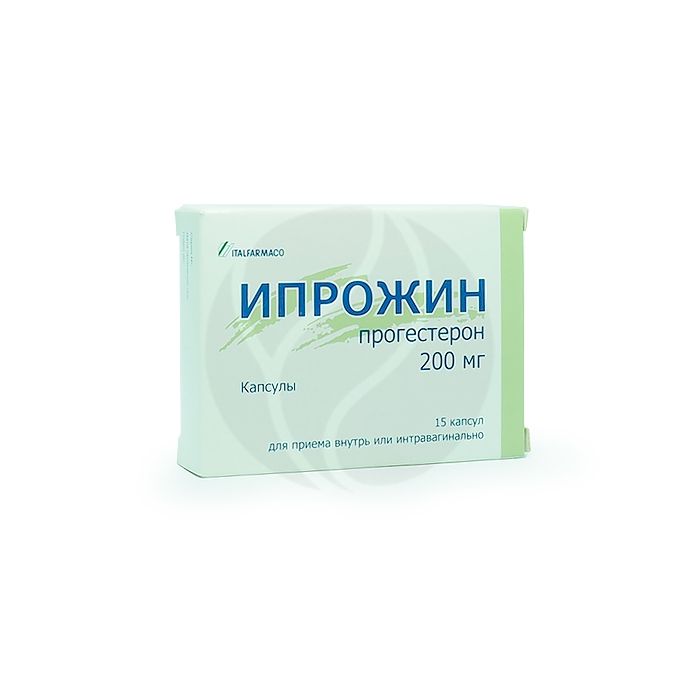Iprozhin capsules 200mg, No. 15
Russian Pharmacy name:
Ипрожин капсулы 200мг, №15
For oral administration:
premenstrual syndrome;
fibrocystic breast disease;
premenopause;
as a gestagen component of hormone replacement therapy in postmenopausal women (in combination with estrogens);
Intravaginally:
hormone replacement therapy with non-functioning (absent) ovaries in case of a complete lack of progesterone (egg donation);
support of the luteal phase during preparation for IVF;
support of the luteal phase in a spontaneous or induced menstrual cycle;
premature menopause, postmenopause (in combination with estrogens);
prevention of habitual and threatening miscarriage due to gestagenic insufficiency;
endocrine infertility;
prevention of uterine fibroids;
endometriosis.
Strictly follow the recommended dosage unless otherwise directed by your doctor.
Inside: in the evening before bedtime (it is not recommended to take before, after or during meals).
With premenstrual syndrome, fibrocystic breast disease, dysmenorrhea, premenopause - 200-300 mg for 10 days (from 17 to 26 days of the cycle);
with hormone replacement therapy in postmenopausal women while taking estrogen - 200 mg / day, for 10-12 days.
Intravaginally:
With egg donation (against the background of estrogen therapy) - 100 mg / day on days 13 and 14 of the cycle, then 100 mg 2 times / day, from 15 to 25 days of the cycle; from day 26 and if pregnancy is determined, the dose increases by 100 mg / day every week, reaching a maximum of 600 mg in 3 divided doses (over 60 days).
To support the luteal phase during the IVF cycle - 400-600 mg / day, starting from the day of HCG injection until the 12th week of pregnancy.
To support the luteal phase in a spontaneous or induced menstrual cycle, with infertility associated with dysfunction of the corpus luteum - 200-300 mg / day, starting from the 17th day of the cycle for 10 days; in case of delay in menstruation and diagnosis of pregnancy, treatment should be continued. With the threat or prevention of abortion - 100-200 mg 2 times / day daily, up to 12 weeks of pregnancy. The duration of treatment is determined by the nature and characteristics of the patient's condition.
Capsules
1 caps.
progesterone
tendency to thrombosis;
acute forms of phlebitis or thromboembolic diseases;
vaginal bleeding of unknown origin;
incomplete abortion;
porphyria;
established or suspected malignant neoplasms of the mammary glands and genitals;
hypersensitivity to any of the ingredients of the drug.
With care: diseases of the cardiovascular system, arterial hypertension, chronic renal failure, diabetes mellitus, bronchial asthma, epilepsy, migraine, depression; hyperlipoproteinemia, lactation period.
Oral route of administration - with severe liver dysfunction.
pharmachologic effect
Gestagen, a hormone of the corpus luteum. By binding to receptors on the surface of target organ cells, it penetrates into the nucleus where, by activating DNA, it stimulates RNA synthesis.
Promotes the transition of the uterine mucosa from the proliferation phase caused by the follicular hormone to the secretory phase, and after fertilization - to the state necessary for the development of a fertilized egg.
Reduces the excitability and contractility of the muscles of the uterus and fallopian tubes, stimulates the development of terminal,
elements of the mammary gland.
By stimulating protein lipase, it increases fat stores, increases glucose utilization, increasing the concentration of basal and stimulated insulin, promotes the accumulation of glycogen in the liver, increases the production of aldosterone; in small doses it accelerates, and in large doses it suppresses the production of gonadotropic hormones of the pituitary gland; reduces azotemia, increases the excretion of nitrogen in the urine. Activates the growth of the secretory acini of the mammary glands and induces lactation. Promotes the development of a normal endometrium.
Pharmacokinetics
When taken orally, it is well absorbed in the gastrointestinal tract, the time to reach Cmax is 1-3 hours.After taking 200 mg, the concentration of progesterone in plasma increases from 0.13 ng / ml to 4.25 ng / ml after 1 hour and is 11.75 ng / ml after 2 hours, 8.37 ng / ml - after 3 hours, 2 ng / ml - after 6 hours, 1.64 ng / ml - after 8 hours.
With intravaginal application, it is rapidly absorbed, a high concentration of progesterone in the plasma is observed after 1 hour. The time to reach Cmax is 2-6 hours. When 100 mg is administered 2 times / day, the average concentration is 9.7 mg / ml for 24 hours. When administered more than 200 mg the concentration of progesterone corresponds to the first trimester of pregnancy. Communication with plasma proteins - 90%.
It is metabolized in the liver with the participation of the CYP2C19 enzyme system. The main metabolites are 20-alpha-hydroxy-delta-4-alpha-pregnanolone and 5-alpha-dihydroprogesterone. It is excreted by the kidneys - 50-60%.
Side effect
Allergic reactions, drowsiness, transient dizziness (1-3 hours after using the drug), shortening of the menstrual cycle, intermenstrual bleeding.
Application during pregnancy and lactation
It should be used with caution during pregnancy due to the risk of liver dysfunction.
With caution - during lactation.
Application for violations of liver function
Oral route of administration: with caution in severe liver dysfunction.
special instructions
The drug should not be used for contraceptive purposes.
Influence on the ability to drive vehicles and use mechanisms
When taken orally, care must be taken when driving vehicles and engaging in other potentially hazardous activities that require increased concentration of attention and speed of psychomotor reactions.
Overdose
The undesirable effects listed above are possible, which disappear when the dose of the drug is reduced.
Drug interactions
Strengthens the effect of diuretics, antihypertensive drugs, immunosuppressants, anticoagulants.
Reduces the lactogenic effect of oxytocin.

